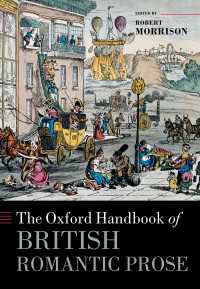- ホーム
- > 洋書
- > 英文書
- > History / World
Full Description
Explaining the Cosmos analyzes the writings of three thinkers associated with Gaza: Aeneas, Zacharias and Procopius. Together, they offer a case study for the appropriation, adaptation, and transformation of classical philosophy in late antiquity, and for cultural transitions more generally in Gaza. Aeneas claimed that the "Academy and Lyceum" had been transferred to Gaza. This book asks what the cultural and intellectual characteristics of the Gazan "Academies" were, and how members of the schools mixed with local cultures of Christians, philosophers, rhetoricians and monks from the local monasteries.
Aeneas, Zacharias and Procopius each contributed to debates about the creation and eternity of the world, which ran from the Neoplatonist Proclus into the sixth-century disputes between Philoponus, Simplicius and Cosmas Indicopleustes. The Gazan contribution is significant in its own right, highlighting distinctive aspects of late-antique Christianity, and it throws the later philosophical debates into sharper relief. Focusing on the creation debates also allows for exploration of the local cultures that constituted Gazan society in the late-fifth and early-sixth centuries. Explaining the Cosmos further explores cultural dynamics in the Gazan schools and monasteries and the wider cultural history of the city. The Gazans adapt and transform aspects of Classical and Neoplatonic culture while rejecting Neoplatonic religious claims. The study also analyses the Gazans' intellectual contributions in the context of Neoplatonism and early Christianity. The Gaza which emerges from this study is a set of cultures in transition, mutually constituting and transforming each other through a fugal pattern of exchange, adaptation, conflict and collaboration.
Contents
Preface ; Abbreviations ; 1 Introduction ; 1.1 Culture and Ideas, Conflict and Identity ; 1.2 Introducing Aeneas, Zacharias and Procopius ; Part One: Creating Gazan Cultures ; 2 Late-Antique Gaza: Teachers, Monks and Philosophers ; 2.1 Social and Material Contours of Late-Antique Gaza ; 2.2 Gazan Rhetorical Schools within Late-Antique Education ; 2.3 Gazan Monasteries and the Schools ; 2.4 Conclusions ; 3 Gazan Culture Performed and Transformed by Aeneas, Zacharias and Procopius ; 3.1 Gaza through Aeneas' Letters ; 3.2 Creating Cultures through the Creation Debates ; 3.3 Reconfiguring Neoplatonic Claims to Power through Narrative and Genre ; 3.4 Conflict and Complexity ; Part Two: Explaining Creation ; 4 Christian and Neoplatonic Creations ; 4.1 Christian Creations ; 4.2 Gazans and Contemporary Neoplatonism ; 4.3 Neoplatonic Creations ; 4.4 Building on Different Traditions ; 5 Procopius on Creation and Eternity ; 5.1 Problems of a Commentator ; 5.2 God and Matter ; 5.3 Matter, Freedom and Determinism ; 5.4 Time and Cause ; 5.5 Theodicy ; 5.6 Problems and Solutions ; 6 Aeneas and Zacharias on Creation and Eternity ; 6.1 Matter, Cause and Time ; 6.2 Creation and Eschatology ; 6.3 Creation and Ethics ; 6.4 Creation and Triunity ; 6.5 Creation and the Soul ; 6.6 Monastic Problems: Aeneas and Origenism ; 6.7 Problems and Solutions ; 7 Conclusions: Creation Creating Cultures ; 7.1 Creatio Continua ; 7.2 Creation of Ideas and Local Cultures ; Bibliography ; Index Locorum ; General Index








